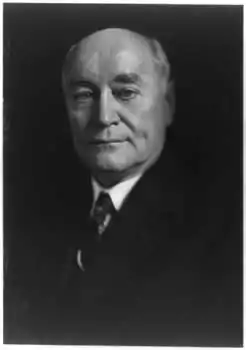James Brown Scott
James Brown Scott, J.U.D. (June 3, 1866 – June 25, 1943) was an American authority on international law.
James Brown Scott | |
|---|---|
 James Brown Scott As Scott appeared on his book published in 1922,'Adventures in Internationalism: A Biography of James Brown Scott' | |
| Born | James Brown Scott June 3, 1866 Kincardine, Canada West |
| Died | June 25, 1943 Annapolis, Maryland, United States |
| Alma mater | Harvard University |
| Occupation(s) | Jurist, legal educator |
Early life
Scott was born at Kincardine, Canada West. He was educated at Harvard University (A.B., 1890; A.M., 1891). As Parker fellow of Harvard he traveled in Europe and studied in Berlin, Heidelberg (J.U.D.), and Paris.
Career
Following his return to the United States, Scott practiced law at Los Angeles, California from 1894 to 1899. He founded the law school at the University of Southern California, and was its dean, though his participation in the Spanish–American War interrupted that role. He was dean of the college of law at the University of Illinois (1899–1903), professor of law at Columbia, and professor of law at George Washington University (1905–06). In 1907 he was expert on international law to the United States delegation at the Second Hague Peace Conference. He also served on a State Department commission which made recommendations to Congress on the reform of United States nationality law, which would result in the Expatriation Act of 1907.[1]
In 1909 Professor Scott lectured at Johns Hopkins. He served as secretary of the Carnegie Endowment for International Peace, and wrote several works on the Hague Conferences of 1899 and 1907 (1908, 1909, 1915). Besides serving as editor in chief of the American Journal of International Law and as editor of the American Case Book, and writing numerous articles on international law and the peace movement.
He also was the champion of the Spanish school of international law of the 16th century, claiming that writers like Francisco de Vitoria and Suarez had already said about that department of the law what about a century later was stated by Hugo de Groot in his De iure belli ac pacis (About the law of war and peace).
Scott was elected to the American Philosophical Society in 1930 and the American Academy of Arts and Sciences in 1935.[2][3]
Works
- Cases on International Law (1 ed.). Boston: Boston Book Company. 1902. Retrieved September 21, 2022 – via Internet Archive..
- Cases on Quasi Contracts (1 ed.). New York: Baker, Voorhis & Company. 1905. Retrieved September 21, 2022 – via Internet Archive..
- Cases on Equity Jurisdiction (1 ed.). New York: Baker, Voorhis & Company. 1906. Retrieved September 21, 2022 – via Internet Archive..
- Argument of the Honorable Elihu Root on Behalf of the United States: Before the North Atlantic Coast Fisheries Arbitration Tribunal at The Hague, 1910 (1 ed.). World Peace Foundation. 1912..
- The Status of the International Court of Justice (1 ed.). New York: Oxford University Press. 1914. Retrieved September 21, 2022 – via Internet Archive..
- The United States: A Study in International Organization (1 ed.). New York: Oxford University Press. 1920. Retrieved July 6, 2017 – via Internet Archive..
- The Catholic conception of international law (1 ed.). Washington, D.C.: Georgetown University Press. 1934. Retrieved September 21, 2022 – via Internet Archive..
Notes
- Tsiang 1942, pp. 104–105
- "APS Member History". search.amphilsoc.org. Retrieved 2023-07-10.
- "James Brown Scott". American Academy of Arts & Sciences. 2023-02-09. Retrieved 2023-07-10.
References
Further reading
- Amorosa, Paolo (2018). The American Project and the Politics of History: James Brown Scott and the Origins of International Law (Ph.D. thesis). University of Helsinki. ISBN 978-951-51-4132-3.